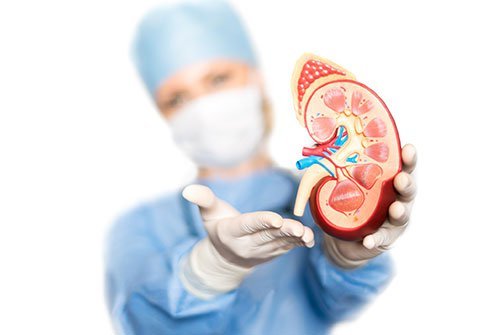What Is the First Stage of Kidney Failure?

Kidney failure, also called renal failure or end-stage kidney disease, occurs when at least 85% of kidney function has been lost.
When your kidneys fail, it causes waste products to build up in the body, which can lead to chemical imbalances in the blood and be fatal if left untreated. People with chronic kidney failure may develop low blood counts or weak bones over time, requiring dialysis or a kidney transplant.
Kidney failure can happen suddenly or gradually. But many people don’t experience any symptoms until their kidneys are already close to complete failure.
What are signs and symptoms of kidney failure?
Symptoms typically begin in the later stages, and there may be very few symptoms in the early stages.
Early symptoms kidney failure may include:
- Decreased urine output
- Shortness of breath
- Disorientation
- Fluid retention (swelling in the limbs)
Other possible symptoms of kidney failure may include:
- Anemia
- Bad breath
- Bone pain
- Changes to skin color or pale skin
- Changes in urine appearance or blood in the urine
- Confusion or memory problems
- Easy bruising
- Fatigue
- Headaches
- High blood pressure that is resistant to medications
- Itchy, dry skin
- Lack of concentration
- Loss of appetite
- Metallic taste in the mouth
- Muscle twitches, cramps, or weakness
- Nausea and vomiting
- Numbness and tingling in fingers or toes
- Seizures
- Trouble sleeping
- Weak bones with increased susceptibility to fractures
- Weight loss
Understanding the 5 stages of kidney failure
The five stages of kidney failure range from very mild damage (stage I) to complete kidney failure (stage V). Stages are based on declining kidney function and glomerular filtration rate (GFR) measurements, which is the rate at which kidneys filter waste from the body.
GFR is calculated based on a blood test that estimates the amount of creatinine (waste product) in the blood. A higher GFR indicates a healthy kidney, whereas lower GFR indicates a suboptimal kidney function. A normal GFR is about 90 to 120 mL/min/1.73 m2.
Symptoms and complications increase as the stages progress.
Stage I (normal or minimal loss of kidney function)
Kidney damage is very mild with GFR 90 mL/min/1.73 m2 or above (normal values). No symptoms are present, but there might be indications of kidney damage in tests, such as the presence of protein in the urine or physical changes of kidneys on a sonogram.
Stage II (mild or moderately reduced kidney function)
Mild kidney damage with GFR between 60 and 89 mL/min/1.73 m2. The filtration rate is slightly subpar. No symptoms are present, but certain indications may be more obvious, such as protein in the urine or physical damage to the kidneys.
Stage III (moderate to severe loss of kidney function)
Kidneys do not work as efficiently as they should, and GFR is between 30 and 59 mL/min/1.73 m2. Symptoms may become apparent at this stage and may include fatigue, swelling in hands and feet, back pain, frequent or infrequent urination, and high blood pressure.
Stage III kidney disease is divided into IIIA and IIIB.
- Stage IIIA (early) refers to GFR between 45 and 59 mL/min/1.73 m2.
- Stage IIIB (late) refers to GFR between 30 and 44 mL/min/1.73 m2.
Stage IV (severely reduced kidney function)
Kidneys are severely damaged with GFR between 15 and 29 mL/min/1.73 m2. This is the last stage before complete kidney failure. Symptoms such as fatigue, swelling, and back pain, may worsen and cause health complications such as anemia, high blood pressure, and bone disease.
Stage V (kidney failure or end-stage renal disease or ESRD)
Kidneys are close to or in complete failure with GFR less than 15 mL/min/1.73 m2. Symptoms of kidney failure become evident and include loss of appetite, vomiting and nausea, muscle cramps, swelling in hands and feet, back pain, urinating more or less than normal, trouble sleeping, breathing trouble, and itchy skin. Patients with kidney failure will need dialysis or a kidney transplant to survive.
